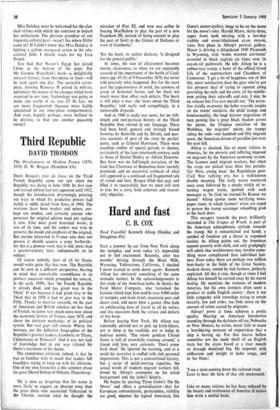Hard and fast
C. B. COX
Hard Travellin' Kenneth Allsop (Hodder and Stoughton 45s) Start a journey by car from New York along the turnpike, and even today it's impossible not to feel excitement. Recently, after two months' driving through the Black Hills, Wyoming, Yellowstone, California, I decided I never wanted to settle down again : Kenneth Allsop hai obviously something of the same nomadic instinct. In the acknowledgements to this study of the American hobo, he thanks the Ford Motor Company, who furnished the Galaxie which kept him mobile over 9,000 miles of turnpike and main street, mountain pass and desert road, and never blew a gasket. One feels an exhilarating love of travel in all he writes, and this occasions both the virtues and defects of this book.
Before leaving New York, Mr Allsop was repeatedly advised not to pick up hitch-hikers, not to sleep at the roadside, not to lodge in dubious motels. `The whole goddam United States is full of screwballs roaming around,' a friend told him, very seriously. 'Don't come back dead.' He ignored the warning, and as a result his narrative is stuffed with rich personal impressions. This is not a conventional history, but a series of quick-moving vignettes, the actual words of modern migrant workers fol- lowed by Allsop's comments on the social background and the hobo's history.
He begins by qUoting Thom Gunn's 'On the Move,' and offers a generalisation—that for Europeans entrenchment, permanence, stability are good, whereas the typical American, like Gunn's motor-cyclists, longs to be on the move for the move's sake. Harold Myers, thirty-three, upper front teeth missing, with a two-day stubble and sweat-blackened straw stetson, takes first place in Allsop's portrait gallery. Myers is driving a dilapidated 1950 Plymouth in Wyoming, with 'WORK WANTED ANYTHING' scrawled in black capitals six times over its eau-de-nil paintwork. He tells Allsop he is a rubber-tyre tramp, a hater of the official Good Life of the supermarkets and Chambers of Commerce. 'I get a lot of happiness out of this life, more satisfaction than the guys who've got this pisspoor deal of trying to squeeze along providing the milk and the corn, all the middle- men getting their rake-offs and cuts. I may be an outcast but I've cast myself out.' The narra- tive vividly re-creates the hobo wayside jungles on the towns' outskirts, the child tramps and homosexuality, the huge harvest migrations of men passing like a great black shadow across the plains, the Utopian socialism of the Wobblies, the migrants' union, the tramps riding the rods—one hundred and fifty migrant years, the American dream of paradise just over the next hill.
Allsop is shocked, like so many visitors to America, by the poverty and suffering imposed on migrants by the American economic system. The farmers need migrant workers, but when the crops are picked treat them like pariahs. "Go West, young man,' the Republican post- Civil War rallying cry, has a well-known double meaning. The early waves westward were soon followed by a steady trickle of re- turning wagon trains, painted with such messages as 'In God we trusted/In Kansas we busted.' Allsop quotes some terrifying news- paper items, in which farmers' wives are urged to poison the tramp scavenger wheedling grub at the back door.
This savagery towards the poor, brilliantly recorded in The Grapes of Wrath, is part of the American schizophrenic attitude towards the tramp. He is romanticised and hated, a symbol of freedom yet a threat to organised society. As Allsop points out, the American equates poverty with sloth, and only grudgingly will admit that worklessness may involve some- thing more complicated than individual lazi- ness. Even today there are perhaps two million bent-backs in the fields of the Great Society, modern slaves, rented by rich farmers, pitilessly exploited. All this is true, though at times I feel Allsop lets himself be carried away by his moral feeling. He mentions the violence of modern America, but his own instincts often seem a product of stable English society: there is too little sympathy with townships trying to create security, law and order, too little stress on the amount of crime caused by migrants.
Allsop's prose at times achieves a poetic quality. Hearing an American locomotive sounding through the darkness of; say, Nebraska or New Mexico, he writes, never fails to cause a bewildering moment of expectation that a ship is hoving up. For that hoarse bellow resembles not the reedy shrill of an English train but the sirens heard at a river mouth or through dockland fog. He responds with enthusiam and insight to hobo songs, and to the blues: 'I see a train coming down the railroad track Love to hear the bark of that old smokestack.'
Like so many visitors, he has been seduced by the beauty and restlessness of America. It makes him write a zestful book.


































 Previous page
Previous page